
Let me tell you about the time I thought I was being so smart about travel booking.
I found this amazing hotel in Vegas for $99 a night. Ninety-nine dollars! In Vegas! I was already planning how I’d spend my savings when I hit “book now.”
Then I got to check out. $138 per night.
Wait… what?
Turns out there was a $39 “resort fee” that magically appeared out of nowhere. That’s a 39% price increase that wasn’t mentioned anywhere when I was comparing hotels. And that’s not even counting taxes, parking, or the “service fee” the booking site tacked on.
Here’s the crazy part: 86% of travelers have experienced exactly this. You’re not alone, and you’re definitely not imagining it.
After years of getting burned (and talking to hundreds of frustrated travelers), I’ve figured out which booking sites are playing games with your money—and more importantly, where you should actually book instead.
Let’s dive in, because this could save you literally hundreds of dollars on your next trip.
Why This Matters Right Now
The Hidden Fee Economy: By The Numbers
How the travel industry’s “junk fee” revenue has exploded
Average Price Increase at Checkout
Okay, so here’s something you need to know: Starting May 12, 2025, there’s a new federal rule forcing booking sites to show you the real price upfront. No more of this “surprise fees at checkout” nonsense.
But until then? It’s the Wild West out there.
Hotels made $2.9 billion from resort fees alone in 2018. Airlines? They raked in $7.6 billion from baggage and change fees that same year. And a huge chunk of that money came from fees that weren’t disclosed until you were already halfway through booking.
You know that feeling when you’ve spent 20 minutes searching for flights, comparing prices, checking dates… and then suddenly the price jumps at checkout? Yeah, they’re counting on you being too invested to start over.
(Spoiler: It’s called the “sunk cost fallacy,” and Columbia Business School did a whole study on how booking sites exploit it. But more on that later.)
The Five Booking Sites I Avoid Like Airplane Middle Seats
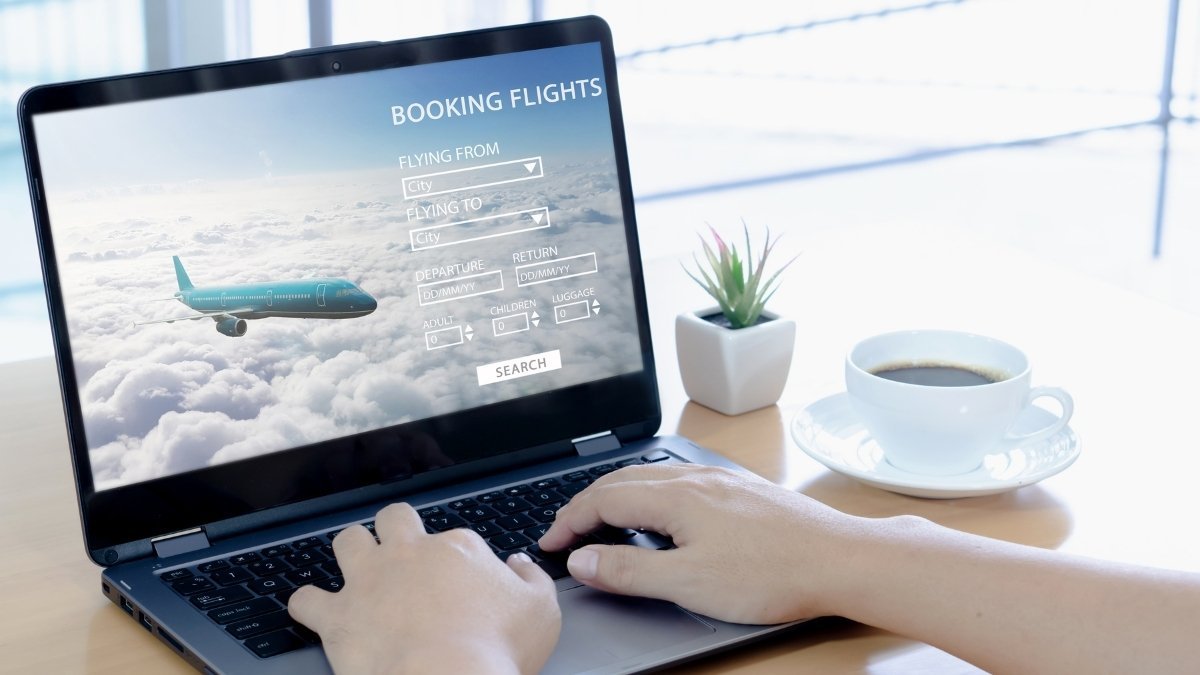
1. Expedia: Where $99 Becomes $138 Real Quick
Remember my Vegas story? That was Expedia.
Here’s their playbook: Show you an insanely attractive price, get you excited, let you spend time browsing and comparing… and then—BAM—here come the fees.
What you’ll actually pay extra:
- Resort fees that aren’t shown upfront ($35-$60 per night is typical)
- Service fees (because… booking things is apparently a service now?)
- Payment processing fees up to 3% for international bookings
- Seat selection fees that can cost MORE than if you booked directly with the airline
- Baggage fees marked up by 20% compared to airline prices
And don’t even get me started on the car rental situation.
Expedia partners with companies like Green Motion (yes, the one with an F rating from the Better Business Bureau). They’ll advertise a rental for $5 a day, and then when you show up at the counter, suddenly you “need” $130 in “mandatory” insurance.
One NBC News investigation found a booking that started at $166 and ended up at $211 by checkout. That’s 27% more expensive!
The customer service nightmare:
Here’s what happens when something goes wrong:
You call Expedia: “Contact the hotel.”
You call the hotel: “Contact Expedia.”
You call Expedia again: “You’re caller number 47 in the queue. Estimated wait time: 1 hour 23 minutes.”
I’ve heard horror stories of people spending a year—yes, an entire year—fighting a travel insurance claim, only to have it denied on technicalities. And they paid $50-$150 for that “coverage.”
2. Booking.com: The 58% Service Fee Scam

Alright, deep breath, because this one made me genuinely angry when I found out.
Booking.com works with these third-party affiliate partners. Sounds innocent enough, right? Except one traveler paid a $155.92 service fee on a $269.16 room rate.
Let me say that again: The service fee was 58% of the room cost.
That money didn’t go to the hotel. It didn’t improve their stay. It went straight into the pocket of a middleman for… clicking some buttons?
The American Hotel and Lodging Association estimates that 28.5 million hotel stays (worth $5.2 billion!) were affected by these deceptive practices in just 2018. That’s nearly 1 in 4 travelers getting misled.
The “free cancellation” trap:
See those listings that say “free cancellation”? Yeah, about that…
You have to specifically filter for those properties. And even when you do, people are still reporting nightmare scenarios:
- Cancelling within TWO MINUTES of booking and still getting charged the full $3,800
- Zero refunds despite confirmed cancellations
- Being told “sorry, that was non-refundable” when the listing clearly said otherwise
3. CheapOair: The Most Ironic Name in Travel

You know a site is bad when it has a 1.14 out of 5-star rating and the name is basically false advertising.
CheapOair charges service fees up to 35% of your ticket price. Let that sink in.
One person found a RyanAir ticket: $64 direct from the airline, $128.20 through CheapOair. That’s a $64 markup for doing literally nothing except inserting themselves between you and the airline.
But wait, it gets worse:
People report getting phone calls AFTER booking, demanding $100+ more per ticket, or their reservation will be cancelled. When questioned, CheapOair claims “the airline changed the price.”
Except when customers call the airline? The airline has no record of any price change.
This is a straight-up bait and switch.
Oh, and there’s the mysterious $11.95 “assisted seating” fee that customers swear they never selected. The “Travel Assist Classic Package” for $50 only gives you a $10 voucher with severely limited use.
Try to cancel? Good luck. One person got $50 back from an $852 ticket, then was told they’d need to pay $595 MORE per ticket just to extend them.
Rick Steves’ travel forum doesn’t mince words: “Airline ticket brokers like Cheapoair are rip offs.”
4. Priceline: “Express Deals” That Aren’t Deals

“Save big by not knowing what hotel you’re booking until after you pay!”
Does that sound like a good deal to you? Because it shouldn’t.
Priceline’s whole business model is “trust us, we’ll pick a good hotel!” And then you can’t compare prices because you don’t know what you’re buying.
Those “savings”? They disappear when you add:
- Resort fees that weren’t disclosed
- Priceline’s own service charges
- Zero ability to comparison shop
Plus, Express Deals are typically non-refundable with no changes allowed. Need to modify your trip? You’ll pay fees to both the provider AND Priceline.
Want the “flexible” option? That costs significantly more upfront. So basically, you’re paying extra to get what should be a basic consumer right.
5. Hotwire: “Hot Rates” with Cold, Hard Reality Checks

Hotwire’s own help center literally admits: “Each hotel may also have its own charges… paid directly to hotel.”
Translation: “We’re not going to tell you the actual price, lol.”
Here’s what doesn’t show up in those tempting “Hot Rates”:
- Resort fees ($35-$60+ per night)
- Parking fees
- Convention fees
- Airport departure taxes for international travel ($5-$40)
And when you have a problem? Hotwire tells you to contact the hotel directly. The hotel tells you to contact Hotwire. Round and round you go.
Frommers.com ranked similar opaque booking models near the bottom for worst last-minute prices in 2025. The “savings” are mostly fake.
Why Do These Sites Keep Getting Away With This?
Great question! Let me break down the business model, because once you understand it, you’ll never book the same way again.
The Commission Game
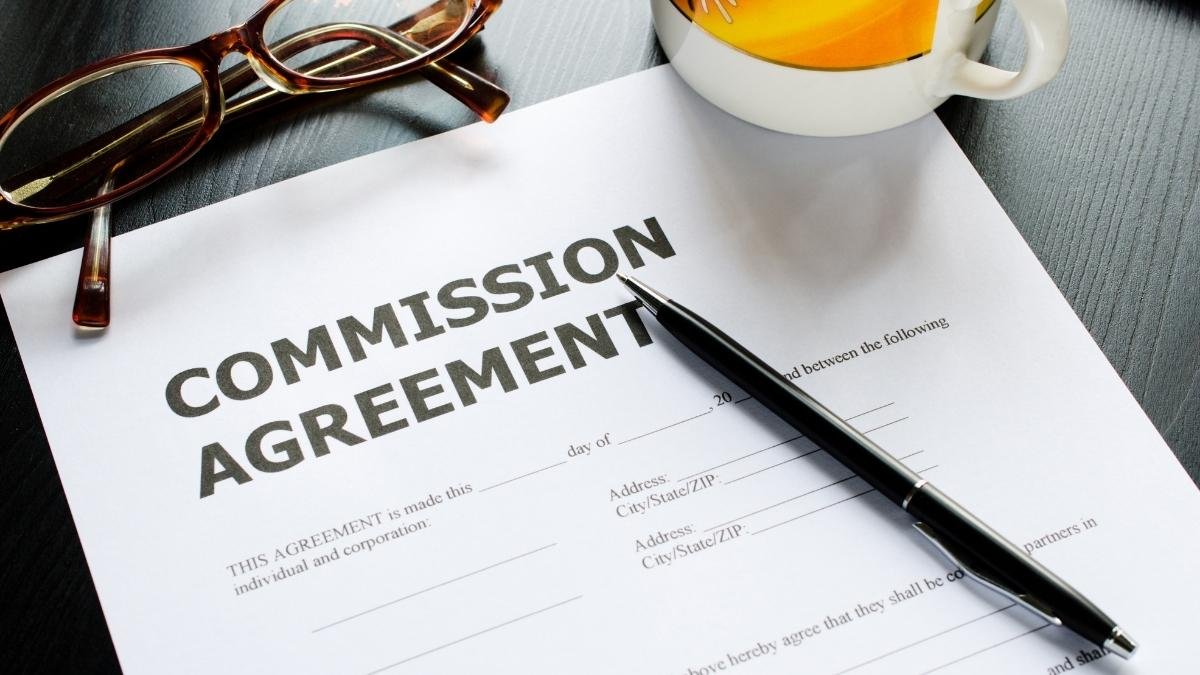
Hotels pay these online travel agencies (OTAs) 15-25% commission on every booking. That’s a huge chunk of money.
So hotels got creative. They invented “resort fees”—charges that historically, OTAs didn’t take commission on. This made the advertised rate lower while keeping the total cost high.
Sneaky, right?
But here’s the twist: Since 2019, Booking.com has started charging commission on resort fees, too. So now BOTH the OTA and the hotel profit from hiding costs from you.
It’s like they’re playing poker and you’re not even at the table.
The Marketing Money Pit

Want to know something wild? Booking Holdings and Expedia combined spent $13.7 billion on marketing in 2023.
Billion. With a B.
Most of that went to Google paid search. You know when you Google “cheap hotels in Miami” and see all those ads at the top? Yeah, that’s them fighting for your click.
And to justify those massive marketing costs, they need you to click on artificially low prices. It’s all about getting you in the door.
The Psychology They’re Using Against You

MIT Professor Glenn Ellison explains it perfectly: “Companies strive to become the lowest-price provider by making their prices APPEAR lower, often by labeling a portion of the cost as a fee.”
It’s not actually cheaper. It just looks cheaper.
Columbia Business School researcher Vicki Morwitz found that once you’ve invested time searching and comparing, you’re way more likely to complete the purchase even after discovering new fees.
They’re literally betting that you won’t want to start over.
And get this: StubHub did an experiment and found that consumers using sites with fees at checkout spent 21% more than those who saw all-in prices upfront.
The industry knows hidden fees make you spend more. That’s exactly why they fight transparency so hard.
The Three Booking Methods I Actually Use (And Recommend)
Okay, enough doom and gloom. Let me show you what actually works.
Alternative #1: Book Directly With Hotels and Airlines (Seriously!)
Smart Booking Methods: Real Savings Breakdown
What you actually save by booking smarter (not “cheaper”)
Book Direct
Credit Card Portals
Costco Travel
Real Example: 5-Night Hawaii Vacation for 2
Decision Matrix: Which Method to Use?
I know, I know. This sounds too simple to be true.
But hear me out.
The hotel wants you to book directly. A study analyzing 18,000 U.S. hotels found that direct bookings are 12.5% more profitable than OTA bookings. When you book through Expedia, the hotel has to give them 15-30% of your payment.
When you book direct, they keep all of it. Which means they have room to negotiate with you.
What you actually save:
✓ No booking fees from third parties
✓ No markup on baggage charges
✓ Direct communication when issues arise (no middleman runaround)
✓ Better prices 50% of the time, according to British consumer group Which?
But here’s the real secret: Loyalty programs
This is HUGE and most people completely miss it.
When you book through an OTA, you get ZERO hotel points. Zero elite night credits. Zero status benefits.
Book directly with chains like Hyatt or Hilton? You’re earning points toward free nights, working toward elite status that gets you:
- Room upgrades
- Late checkout
- Complimentary breakfast
- Free WiFi
Let me put a dollar value on this: Daily breakfast for two can easily be worth $30-50. On a five-night stay, that’s $150-250 in value you’re leaving on the table by booking through an OTA.
How to actually negotiate with hotels:
- Find the rate on Expedia (screenshot it)
- Call the hotel directly
- Say this exact script: “I found your deluxe room for $X on Expedia. Can you match this rate?”
Hotels can usually match or beat it because they’re saving that 15-30% commission.
- Then ask for added value: “If you can include free parking and breakfast, I’ll book directly today.”
I’ve done this dozens of times. It works.
Alternative #2: Credit Card Travel Portals (This Changed My Life)

Okay, this is where things get really interesting.
Premium travel credit cards have their own booking portals—Chase Travel, Capital One Travel, and Amex Travel. And they’re actually… good?
The points multiplier magic:
Here’s how it works with Chase Sapphire Preferred:
- You earn 5x points on travel booked through Chase Travel
- Points are worth 1.25 cents each when redeemed through the portal
- That’s an effective 6.25% return on your spending
Chase Sapphire Reserve is even better:
- 10x points on hotels and rental cars
- Points are worth 1.5 cents each
- That’s a 15% effective return!
Show me an OTA offering you 15% back. I’ll wait.
But are the prices higher?
Here’s the thing: Analysis of 785 data points across 157 flight itineraries found Chase Travel prices were actually LESS expensive than booking direct on average.
Capital One Travel matched direct booking prices more than 50% of the time.
You’re not paying extra for points. You’re getting the same price PLUS enhanced rewards.
Real example that blew my mind:
The JW Marriott Anaheim would cost 166,000 Marriott Bonvoy points for a standard booking.
Using Chase’s Points Boost feature? Just 59,000 Chase points.
That’s a savings of 107,000 points—equivalent to $2,140. Plus, you get a $100 property credit and daily breakfast for two (another $100 value).
Total savings from booking smarter: over $2,340.
For one hotel stay.
Capital One has price protection:
If prices drop within 10 days after you book (based on Capital One’s recommendation), they’ll credit you the difference up to $50.
Their 24/7 price monitoring has helped people save an average of 15% on flights.
Travel protections you’re getting anyway:
Premium travel cards include:
- Trip cancellation/interruption insurance (up to $5,000-$10,000 per trip)
- Travel delay reimbursement
- Lost luggage coverage
- No foreign transaction fees
These are worth hundreds of dollars that OTAs charge separately for as add-ons.
Alternative #3: Costco Travel (No, Really!)

I can hear you now: “Costco? For travel?”
Yes. Costco. Let me explain.
The package deal sweet spot:
Costco Travel consistently delivers vacation packages $300-500 cheaper than booking everything separately.
But it’s not just about the base price. Look at what’s included:
- Resort credits ($50-300)
- Daily breakfast for two
- Waived resort fees (this alone is huge)
- Digital Costco Shop Cards ($100-500) for future purchases
Real example from someone’s Cancun trip:
TRS Coral, three nights:
- $300+ less than booking direct
- Free hydrotherapy spa circuit included
- $241 Digital Shop Card
Total value: $541+ in savings and perks.
Another one from Maui:
Hotel Wailea, five nights:
- Costco package with rental car: $4,482.46
- Booking separately: $4,918.91
- Savings including breakfast, resort credits, and Shop Card: $1,442.45
That’s enough to fund your next trip!
The transparency advantage:
Costco’s brand reputation is built on trust. They can’t play games with pricing because their members would revolt.
All-in pricing. No hidden fees. Everything is clearly listed upfront.
This is what booking should always be like.
The Executive Member bonus:
Executive membership ($120/year) gets you 2% back on all Costco purchases, including travel, capped at $1,250 annually.
Combine that with the Costco Anywhere Visa card’s 3% cash back on travel, and you’re getting 5% total return.
On a $5,000 vacation package, that’s $250 back. The membership paid for itself twice over.
Where Costco wins big:
- All-inclusive resorts in Mexico and the Caribbean
- Theme park packages (Disney, Universal)
- Luxury resort stays
- Hawaii vacations
- Cruises
For properties outside major hotel loyalty programs, you lose nothing by booking through Costco and gain significant value.
Your Step-by-Step Action Plan to Never Get Ripped Off Again
Your Pre-Booking Checklist
Follow these 7 steps before clicking “book” to avoid hidden fees
🚩 Red Flags: Walk Away If You See These
🛠️ Essential Free Tools to Install Today
Alright, let’s make this practical. Here’s exactly what to do.
Step 1: Install These Free Browser Extensions Right Now
Before you do another travel search, install these:
Hotel Ninja or RatePunk: These automatically compare prices across Expedia, Booking.com, Agoda, and Hotels.com while you browse. Users have collectively saved over $3.5 million.
Directo: Shows you the direct hotel website link while you’re browsing OTAs. One click and you’re booking direct.
Fare Compare by Jack’s Flight Club: Automatically searches Skyscanner, Momondo, and Kayak alongside Google Flights.
Takes 5 minutes to set up. It could save you hundreds per trip.
Step 2: Master the Fine Print Reading System
Use your browser’s search function (Ctrl+F or Cmd+F) and search for these exact words on every booking page:
- “fee”
- “charge”
- “additional”
- “extra”
- “mandatory”
- “surcharge”
- “deposit”
Read every single instance. Takes 60 seconds. Saves you $200+.
Step 3: Calculate the TRUE Total Cost
Here’s the formula:
Base rate × nights + resort/facility fees × nights + cleaning fee + parking × nights + estimated taxes = REAL PRICE
Only compare these total costs. Never just base rates.
Step 4: Ask These Questions Before Booking
For hotels:
- “What is the TOTAL price including all mandatory fees?”
- “Are there resort/facility/destination fees and how much?”
- “Is parking included?”
- “What is your cancellation policy—word for word?”
For vacation rentals:
- “What is the cleaning fee?”
- “Are there service fees beyond the cleaning fee?”
- “What’s the damage waiver amount?”
- “Can I have the full address before paying?” (Some listings misrepresent locations)
For flights:
- “Does this price include checked baggage?”
- “Are there seat selection fees?”
- “What are the change/cancellation fees in dollars?”
Step 5: Spot These Red Flags Instantly
🚩 Prices shown “per person” for accommodations
🚩 Phrases like “starting at,” “from,” or “plus applicable fees” in small text
🚩 Price increases dramatically from search to checkout
🚩 Fee breakdown only appears on the final payment screen
🚩 Pressure tactics like “only 1 room left!” or countdown timers
🚩 Reviews consistently mention unexpected fees
See any of these? Walk away.
Step 6: The Direct Booking Negotiation Script (Copy/Paste This)
- Find the property on an OTA and screenshot the total price
- Call the hotel directly
- Use this exact script:
“Hi! I found your [room type] for $X total on [OTA]. Can you match or beat this rate? I prefer to book directly.”
Hotels save 15-30% in OTA commissions. They can often match or beat it.
- Then ask for added value:
“If you can include free breakfast and parking, I’ll book directly with you today.”
Works. Every. Time.
Step 7: Protect Yourself at the Property
- Review charges before signing at check-in (yes, actually read them)
- Question any unexpected fees politely but firmly
- If advertised amenities are unavailable (pool closed, WiFi down), ask for fee waivers
- Review your bill LINE BY LINE at checkout
- Dispute charges for unused services immediately
- Get an itemized receipt and keep it
The Big Changes Coming (And What They Actually Mean for You)
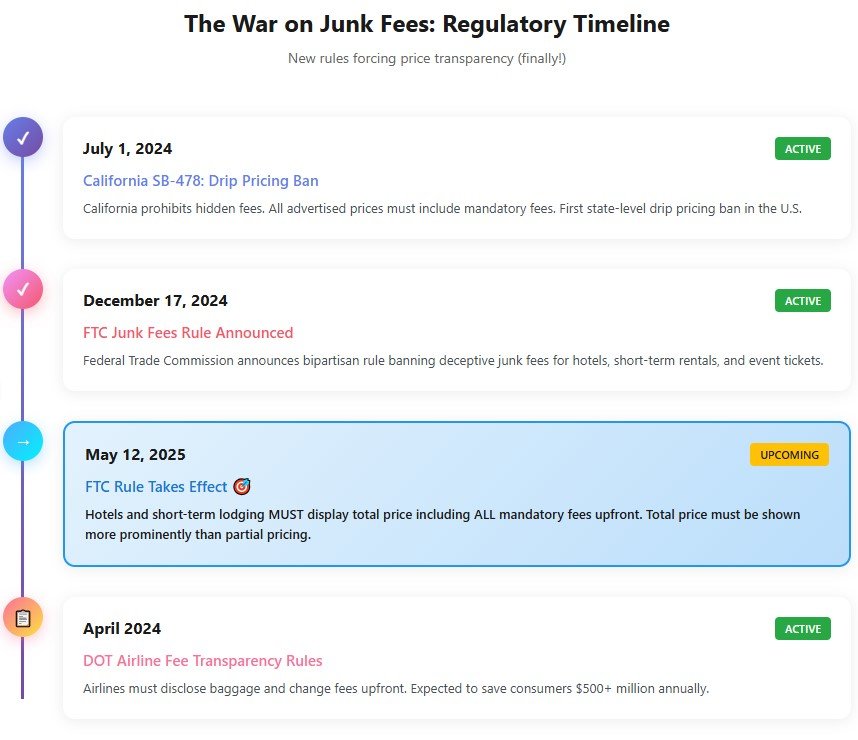
Remember that new FTC rule I mentioned at the beginning?
Starting May 12, 2025, hotels and short-term lodging platforms MUST show you the total price, including all mandatory fees, upfront.
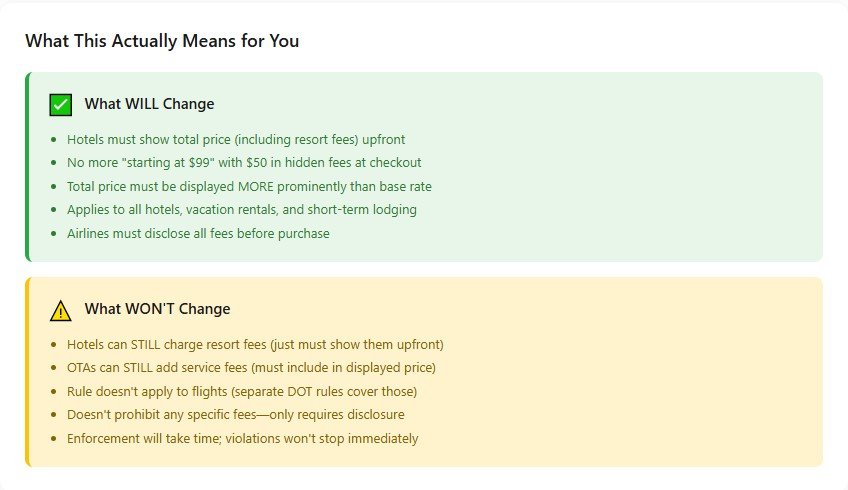
No more resort fee surprises at checkout. The total price has to be displayed more prominently than any partial pricing.
California already implemented this in July 2024. Multiple state attorneys general are suing hotel chains over resort fees.
The Department of Transportation finalized similar rules for airlines. They expect this to save consumers $500+ million annually.
But here’s what you need to understand:
This rule doesn’t apply to flights (those have separate DOT rules). It doesn’t prohibit any specific fees. It only requires disclosure, not elimination.
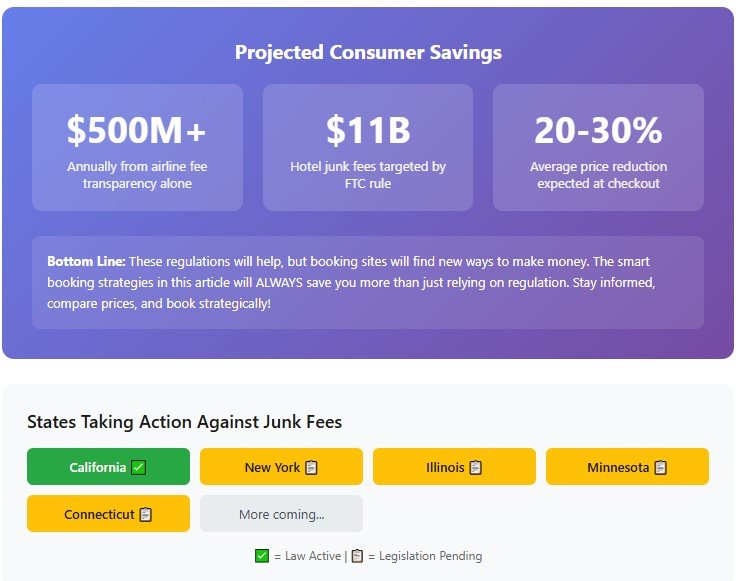
Hotels can still charge resort fees. They just have to show them upfront.
OTAs can still add service fees. They just have to include them in the displayed price.
And enforcement? That takes time.
The industry spent DECADES perfecting fee extraction. They’re not going to stop just because of new regulations.
Which is exactly why you need to know these alternatives and techniques. You have to be smarter than their algorithms.
Here’s What You Need to Do Right Now

Let’s be real: You’re probably not going to remember all of this when you’re booking your next trip.
So let me give you the absolute simplest action plan:
Do these three things today:
- Install the Hotel Ninja browser extension (or RatePunk if you prefer). Takes 2 minutes. It will save you money automatically on every search. No thinking required.
- Bookmark this article. Seriously. Save it. Next time you’re booking travel, come back and use it as a checklist.
- Pick ONE of the three alternatives I recommended and try it on your next trip:
- If you travel frequently, → Apply for a travel rewards credit card
- If you want vacation packages, → Get a Costco membership
- If you wish to simplify, → call hotels directly
Here’s the truth bomb:
The average traveler pays 20-30% more than the advertised price. Some bookings MORE THAN DOUBLE at checkout.
On a $1,000 trip, that’s $200-300 in unnecessary fees.
Take five trips a year? That’s $1,000-1,500 wasted annually.
Over a decade? We’re talking $10,000-15,000 straight into the pockets of booking sites for… what exactly?
My Final Thoughts

Look, I get it. These booking sites are convenient. They aggregate everything in one place. The interface is familiar.
But they’re literally designed to extract as much money from you as possible while making you think you’re getting a deal.
The hotel industry made $2.9 billion from resort fees in 2018. Airlines made $7.6 billion from baggage and change fees. Those numbers have only grown since.
That money came from somewhere. It came from travelers just like you who thought they were being smart by finding the “cheapest” option online.
Starting next month, you’ll at least see the real prices upfront for hotels. But even then, these sites will find new ways to make money off you.
The only real solution is to change how you book.
Use the three alternatives I gave you. Install those browser extensions. Learn to negotiate with hotels directly. Stop letting middlemen insert themselves between you and a fair price.
Your wallet will thank you. And you might even be able to take an extra trip with all the money you save.
Now, if you’ll excuse me, I have a direct hotel booking to make. 😉
Over to you: Have you been burned by hidden fees on booking sites? Which of these alternatives are you going to try first? Drop a comment below—I read every single one, and I’d love to hear your stories (and answer any questions you have).
And if this helped you, share it with anyone in your life who travels. Let’s stop feeding the fee monster together.






